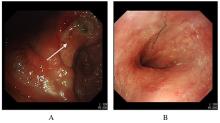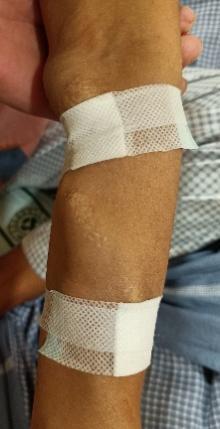| 1 |
金其庄,王玉柱,叶朝阳,等.中国血液透析用血管通路专家共识(第2版)[J].中国血液净化,2019,18(6):365-381.
|
| 2 |
HOLDEN R M, HARMAN G J, WANG M, et al. Major bleeding in hemodialysis patients.[J]. Clin J Am Soc Nephrol, 2008, 3(1):105-110.
|
| 3 |
黄伟,郭汉林.慢性肾功能衰竭维持性血液透析患者死因分析及防治措施[J].广东医学,2007(10):1681-1682.
|
| 4 |
黄伟.《第三版脓毒症与感染性休克定义国际共识》解读[J].中国实用内科杂志,2016,36(11):959-962.
|
| 5 |
MUREA, JAMES, KM, et al. Risk of catheter-related bloodstream infection in elderly patients on hemodialysis[J]. Clin J Am Soc Nephrol, 2014,9(4):764-770.
|
| 6 |
Access Vascular 2006 Work Group.Clinical practice guidelines for vascular access[J].Am J Kidney Dis,2006,48():S176-247.
|
| 7 |
MORAN J, SUN S, KHABABA I, et al.A randomized trial comparing gentamicin/citrate and heparin locks for central venous catheters in maintenance hemodialysis patients.[J]. Am J Kidney Dis, 2012, 59(1):102-107.
|
| 8 |
张丽萍,付阿丹,朱江,等.血液透析患者导管相关性血流感染风险评估研究[J].中华医院感染学杂志,2015,25(23):5421-5423.
|
| 9 |
HOCKENHULL J C, DWAN K, BOLAND A, et al. The clinical effectiveness and cost-effectiveness of central venous catheters treated with anti-infective agents in preventing bloodstream infections: a systematic review and economic evaluation.[J]. Health Technol Assess, 2008, 12(12):17-21.
|
| 10 |
MOORE C L, BESARAB A, AJLUNI M, et al. Comparative effectiveness of two catheter locking solutions to reduce catheter-related bloodstream infection in hemodialysis patients[J]. Clin J Am Soc Nephrol, 2014, 9(7):1232-1239.
|
| 11 |
赵茜芸,丛静静,鲁业芳,等.血液透析患者中心静脉导管相关性血流感染的病原菌分布与耐药性及相关因素分析[J].中华医院感染学杂志,2017,27(21):4891-4894.
|
| 12 |
金海姣,倪兆慧.血液透析血管通路的临床应用现状分析[J].中国血液净化,2016,15(1):39-41.
|
| 13 |
BRADBURY B D, CHEN F, FURNISS A, et al. Conversion of vascular access type among incident hemodialysis patients: Description and association with mortality[J]. Am J Kidney Dis, 2009, 53(5):804-814.
|
| 14 |
曹彩霞,刘飞燕,万珍,等.持续血液净化治疗肾功能障碍感染性休克的临床疗效评价[J].中国全科医学,2020,23(S1):177-178.
|
| 15 |
马坚,胡必杰.导管相关性血流感染的预防控制指南2011年版本[J].中华医院感染学杂志,2011,21(12):2648-2650.
|
| 16 |
GU F, HE W, XIAO S, et al. Antimicrobial resistance and molecular epidemiology of Staphylococcus aureus causing bloodstream infections at Ruijin Hospital in Shanghai from 2013 to 2018[J]. Sci Rep, 2020,10(1):6019.
|
| 17 |
谢朝云,蒙桂鸾,熊芸,等.中心静脉导管相关性血流感染预后相关因素分析[J].中国医学科学院学报,2020,42(6):789-794.
|
| 18 |
曹小云,曹花云,陈群菊,等.维持性血液透析患者血流感染病原菌与耐药基因分析[J].中华医院感染学杂志,2021(12):1835-1839.
|
| 19 |
张双霞. 血清PCT、sTREM-1在感染性疾病中的应用研究[D].长春:吉林大学,2020.
|
| 20 |
虞意华,蔡国龙,吴亮,等.降钙素原在危重病患者导管相关性血行感染中的早期诊断价值[J].实用医学杂志,2009,25(10):1581-1583.
|
| 21 |
孙明继, 赵新菊, 唐盛,等.维持性血液透析死亡患者相关信息及贫血治疗情况的多中心回顾性分析[J]. 中国血液净化, 2019(9):618-621.
|
| 22 |
HUANG Q, SUN X, LIN H, et al. Current status of anticoagulant treatments and improvements for hemodialysis patients in northern Chinese cities: a five-year comparative study.[J]. 中华医学杂志(英文版), 2014, 127(16):2881-2887.
|
| 23 |
张丹丹,洪 葵.非维生素K拮抗剂口服抗凝药在特殊人群中的应用与研究进展[J].中国实用内科杂志,2021,41(8):725-728.
|








